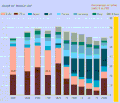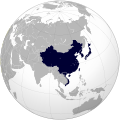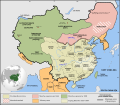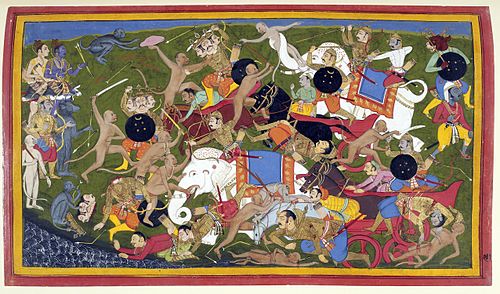Portal:Asia

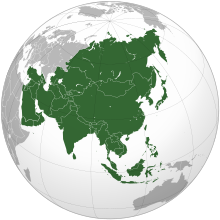 Asia (/ˈeɪʒə/ AY-zhə, UK also /ˈeɪʃə/ AY-shə) is the largest continent in the world by both land area and population. It covers an area of more than 44 million square kilometers, about 30% of Earth's total land area and 8% of Earth's total surface area. The continent, which has long been home to the majority of the human population, was the site of many of the first civilizations. Its 4.7 billion people constitute roughly 60% of the world's population. Asia shares the landmass of Eurasia with Europe, and of Afro-Eurasia with both Europe and Africa. In general terms, it is bounded on the east by the Pacific Ocean, on the south by the Indian Ocean, and on the north by the Arctic Ocean. The border of Asia with Europe is a historical and cultural construct, as there is no clear physical and geographical separation between them. It is somewhat arbitrary and has moved since its first conception in classical antiquity. The division of Eurasia into two continents reflects East–West cultural, linguistic, and ethnic differences, some of which vary on a spectrum rather than with a sharp dividing line. A commonly accepted division places Asia to the east of the Suez Canal separating it from Africa; and to the east of the Turkish Straits, the Ural Mountains and Ural River, and to the south of the Caucasus Mountains and the Caspian and Black seas, separating it from Europe. China and India traded places as the largest economies in the world from 1 to 1800 CE. China was a major economic power for much of recorded history, with the highest GDP per capita until 1500. The Silk Road became the main east–west trading route in the Asian hinterlands while the Straits of Malacca stood as a major sea route. Asia has exhibited economic dynamism as well as robust population growth during the 20th century, but overall population growth has since fallen. Asia was the birthplace of most of the world's mainstream religions including Hinduism, Zoroastrianism, Judaism, Jainism, Buddhism, Confucianism, Taoism, Christianity, Islam, Sikhism, as well as many other religions. (Full article...) Featured articleA series of violent riots over several days broke out on 5 July 2009 in Ürümqi, the capital city of the Xinjiang Uyghur Autonomous Region (XUAR), in northwestern China. The first day's rioting, which involved at least 1,000 Uyghurs, began as a protest, but escalated into violent attacks that mainly targeted Han people. According to Chinese state media, a total of 197 people died, most of whom were Han people or non-Muslim minorities, with 1,721 others injured and many vehicles and buildings destroyed. Many Uyghurs disappeared during wide-scale police sweeps in the days following the riots; Human Rights Watch (HRW) documented 43 cases and said figures for real disappearances were likely to be much higher. Rioting began following the Shaoguan incident, where false accusations of rape of a Han woman by Uyghur men led to a brawl between ethnic Han and Uyghur factory workers in Shaoguan, resulting in the deaths of two Uyghurs who were both from Xinjiang. The Chinese government claimed that the riots were planned from abroad by the World Uyghur Congress (WUC) and its leader Rebiya Kadeer. Kadeer denies fomenting the violence in her fight for Uyghur self-determination. (Full article...)Selected Country Azerbaijan, officially the Republic of Azerbaijan, is a transcontinental country located at the boundary of Eastern Europe and West Asia. It is a part of the South Caucasus region and is bounded by the Caspian Sea to the east, Russia's republic of Dagestan to the north, Georgia to the northwest, Armenia and Turkey to the west, and Iran to the south. Baku is the capital and largest city. The territory of what is now Azerbaijan was first ruled by Caucasian Albania and later various Persian empires. Until the 19th century, it remained part of Qajar Iran, but the Russo-Persian wars of 1804–1813 and 1826–1828 forced the Qajar Empire to cede its Caucasian territories to the Russian Empire; the treaties of Gulistan in 1813 and Turkmenchay in 1828 defined the border between Russia and Iran. The region north of the Aras was part of Iran until it was conquered by Russia in the 19th century, where it was administered as part of the Caucasus Viceroyalty. (Full article...)Featured biographySatyajit Ray (Bengali pronunciation: [ˈʃotːodʒit ˈrae̯] ; 2 May 1921 – 23 April 1992) was an Indian director, screenwriter, documentary filmmaker, author, essayist, lyricist, magazine editor, illustrator, calligrapher, and composer. Ray is widely considered one of the greatest and most influential film directors in the history of cinema. He is celebrated for works including The Apu Trilogy (1955–1959), The Music Room (1958), The Big City (1963) and Charulata (1964) and the Goopy–Bagha trilogy. Ray was born in Calcutta to author Sukumar Ray and Suprabha Ray. Starting his career as a commercial artist, Ray was drawn into independent film-making after meeting French filmmaker Jean Renoir and viewing Vittorio De Sica's Italian neorealist film Bicycle Thieves (1948) during a visit to London. (Full article...)General imagesThe following are images from various Asia-related articles on Wikipedia. Featured pictureA scene from the Ramayana, an ancient Sanskrit epic. Depicted here are several stages of the War of Lanka, with the monkey army of the protagonist Rama (top left, blue figure) fighting the demon army of the king of Lanka, Ravana, to save Rama's kidnapped wife Sita. The three-headed figure of the demon general Trisiras occurs in several places – most dramatically at the bottom left, where he is shown beheaded by Hanuman.
Did you know...
Updated: 6:33, 14 February 2024 In the news
Related portalsMajor Religions in Asia Middle East Central Asia and Surroundings Indian Subcontinent Southeast Asia East Asia Selected panorama
The Hajj is an annual Islamic pilgrimage to Mecca, Saudi Arabia, the holiest city for Muslims, and a mandatory religious duty for Muslims that must be carried out at least once in their lifetime by all adult Muslims who are physically and financially capable of undertaking the journey, and can support their family during their absence. TopicsCategoriesAssociated WikimediaThe following Wikimedia Foundation sister projects provide more on this subject:
More portalsShortcuts to this page: Asia portal • P:ASIA Purge server cache |


























